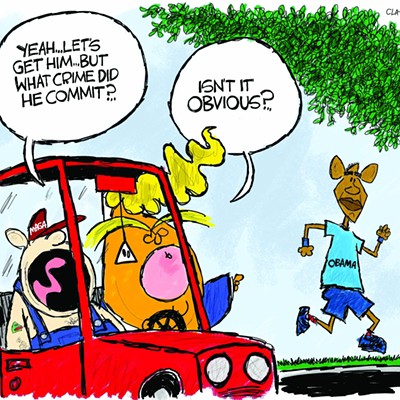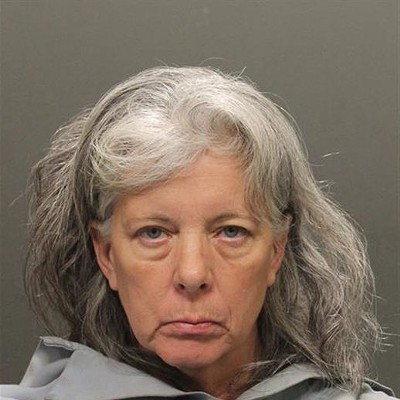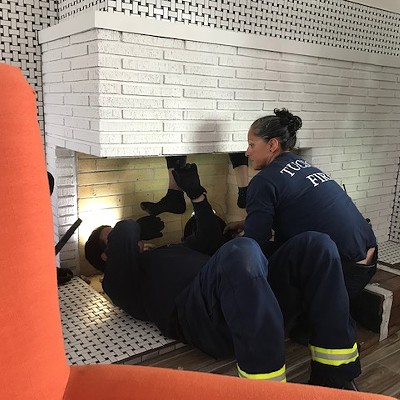Unfortunately, it's not the UA basketball team that's No. 1 this year. It's the city's crime rate: Tucson has the most crime in the nation, according to the 2002 FBI Uniform Crime Report.
In a rating of the 100 largest metropolitan areas, Tucson managed to beat them all, including New York, Washington, D.C., Miami and Phoenix. The Tucson Police Department was quick to downplay the statistics, pointing out that property crimes, not violent crimes, that made Tucson the frontrunner.
On March 8, Elaine Weaver became one of those property-crime statistics when the guest house she rents was broken into. Although police responded and took fingerprints, when she called the burglary detective, Weaver says, she was told the case had already been classified "informational," because there were "no leads." Days later, a detective knocked on her door and told her they might have two suspects in her case. One suspect was caught burglarizing another home, but the detective explained that he'd been released by the courts without a confirmation of his real name or an address. The other suspect hasn't been found, leaving Weaver with little hope that her case will be solved.
When the FBI report was released on March 16, Weaver was indignant. In trying to explain away the rating, a TPD spokesman was quoted as saying the FBI report "gives the theft of a garden hose the same weight as a murder."
In the course of the burglary, bars on Weaver's window were ripped off, and the window itself was broken. Her stereo, leather jacket and a jewelry case were stolen; in the jewelry case were her parents' wedding rings--certainly not the equivalent of a garden hose.
Weaver and her boyfriend, C.J. Karamargin, who owns the home (and who is a reporter for the Arizona Daily Star), appeared at the March 15 Tucson City Council meeting. Karamargin also spoke at the March 16 Citizens' Police Advisory Review Board. The plea by Weaver and Karamargin to the mayor, the City Council and the TPD was simple: Increase patrols in our neighborhoods. They're convinced that increased police presence will cut down on property crimes.
"Public Safety is the single most important factor in our quality of life," Weaver says. "The mayor and council can talk all they want about Rio Nuevo, downtown, bringing in new business and traffic problems, but none of it will make any difference if Tucsonans don't feel safe in their own homes."
Weaver believes burglary in Tucson is an epidemic, and the FBI statistics appear to confirm that. The day of Weaver's burglary, police said three other homes in her area were burglarized. Upon further investigation, she discovered that several other homes and businesses within blocks of hers had recently been burglarized or robbed, including the Santa Barbara Ice Creamery, Plaza Liquors, Le Bistro, Rainbow Guitars and Raging Sage.
"Property crimes are an enormous issue," says Assistant Police Chief John Leavitt. "It is not something that has been consciously neglected by TPD, but for five years, resources have been purposely redirected to violent crimes. The community has lacked sufficient resources to do both sides of the equation."
Leavitt says Police Chief Richard Miranda understands this is a quality-of-life issue, and he's examining how TPD can best address the problem. It's a problem that Leavitt says he's sympathetic to--his parents, who are midtown residents, have been burglarized four times.
The 2002 FBI Uniform Crime Report shows approximately 6445 burglaries, 28,800 incidents of larceny and 5125 car thefts in Tucson that year. Leavitt notes that most of the crimes were incidents of larceny--meaning there was no illegal entry--such as stolen car tags or porch furniture.
TPD's Burglary Unit consists of eight detectives and one sergeant. The department is clearly overwhelmed and reported a 6.7 percent solution rate for 2003, meaning that 93 percent of all reported property crimes are not being solved.
Carol Clark, an aide to City Councilwoman Kathleen Dunbar, also plays down the FBI report, using the same "garden hose as murder" analogy. She wants to assure the public, however, that Dunbar supports increasing the number of police in Tucson.
Karamargin doesn't care about statistics.
"You can slice and dice statistics any way you want," he says. "The fact is, the FBI report rates Tucson No. 1 in crime. No citizen should have to make a choice between being the victim of a violent crime or burglary."
A check of this year's statistics so far seems to indicate that property crimes may even be higher for 2004. Tucson is a huge drug corridor--thanks in large part to its proximity to the border--and is rife with methamphetamine users, all of which contributes to our crime rate.
If you have not been a victim of a property crime already, with some 40,370 reported property crimes a year, you're likely to become one. (Full disclosure: I have been one as well.)
Karamargin speculates that if the approximately 3,364 victims of property crimes every month all went before the City Council to demand increased services, those services would increase.
Just as an aside: Though police point out that the murder rate was low in Tucson--we were ranked 24th in the 2002 FBI Report--murders have more than doubled in Tucson from this time last year.












